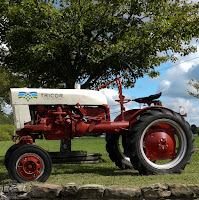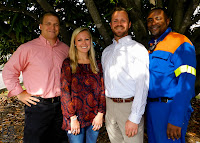The following is an abbreviated grant outline:
GOAL: Promote co-composting of food and packaging waste
OBJECTIVES:
1) Demonstrate the functional feasibility and community benefits of co-composting
Food &Paper Waste (waste diversion, methane generation avoidance, and material reuse: waste generator education; identification of some important co-composting process variables; and creation of a marketable compost product;
2) Benchmark typical F&PW feedstock characteristics;
3) Collect economic and environmental data about F&PW composting; and
4) Disseminate findings to stimulate new programs nationwide.
TASKS
TASKS
Task 1. Route Optimization
Task 2. Enlistment and Training of Participants
Task 3. Waste Collection and Transport
Task 4. Composting, Monitoring, and Evaluation
Task 5. Characterization Data
Task 6. Final Report and Dissemination
 |
| Anne Bedarf & Ei founder Holly Elmore |
In anticipation of grant funding, the team met for a strategy session during the 2012 Carolina Recycling Association’s Food Waste Conference in Charlotte. Discussion centered around how to most effectively utilize the grant for permanent, long-term action. Route density was emphasized as critical to create systems grounded in solid business sense.
With Mecklenburg County support, UNC Charlotte utilized student availability to produce a draft Route Optimization Report. As pilot participants are determined the report will evolve into its final format. Per the introduction, below is the report scope:
This particular task of the project aims to utilize Geographical Information Systems (GIS) technology to (i) identify and map facilities known to employ compostable food containers or have a corporate strategy that would support it, (ii) identify and map an initial set of facilities in the area of North Charlotte which are potential participators during the first phase of the program, (iii) suggest optimal pickup routes and schedules for this initial set of pickup locations in order to maximize capacity and minimize cost, and (iv) address considerations for future program extension in terms of site.On October 01, the team convened for their first official conference call to develop action points within grant goals, objectives and tasks. Unfortunately, the call aligned with the federal government "shutdown" and the EPA folks could not participate. Each participant educated the group on their Charlotte connections along with their planned contributions to the grant pilot. Most of the general discussion centered around the prime pilot participants to recruit.
 |
| Steam releasing while the windrows are turned @ Earth Farms |
Ei is honored and thrilled to join the SPC grant team. With the Sustainable Food Court Initiative Shopping Mall Pilot located in the Charlotte area, Ei has strong Charlotte working relationships. Along with the local SFCI team, Ei worked closely with Jim Lanier of Earth Farms on back-of-the house food waste collection for composting at the pilot mall, Concord Mills. The ZWA Blog post, ACTION: Theme for SFCI Shopping Mall Pilot, recaps the food waste collection journey as well as other zero waste initiatives.
In March 2013 Ei Partners HMSHost and Simon Property Group hosted the Charlotte Ei Partner Tours for two action-packed days of tours, presentations and camaraderie. The IMPACT Blog post, Charlotte Ei Partner Tours, recaps the Charlotte visit and is supported by the Ei FB album. 03-04-13 Charlotte Ei Partner Tours - Day One.
 |
| Laurette Hall w/ Linda Dunn of HMSHost @ Ei Ptr Tours |
Ei works closely with Mecklenburg County. For the Charlotte Ei Partner Tours, Laurette Hall - Mecklenburg County director of sustainability - joined the tours on the first day and Keep Mecklenburg Beautiful executive director Jake Wilson was with the group for both days.
Scaling composting up in Charlotte is staged for success. The EPA grant is an excellent opportunity to showcase the magic inherent within public | private partnerships. Stay tuned as The ZWA Blog will chronicle the road to success!



















